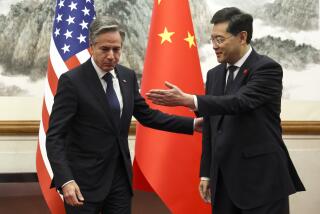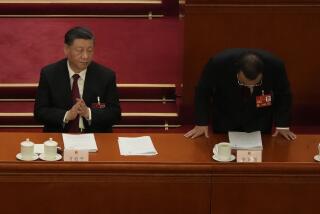The No. 2 Spot a Tenuous Position in Politically Volatile Peking
- Share via
PEKING — By effectively ousting top-ranking aide Hu Yaobang, Chinese leader Deng Xiaoping on Friday perpetuated a tradition of Peking leaders abruptly undercutting the men who were in line to succeed them.
Under Deng, however, in contrast with some earlier cases, the victims of the power struggles manage to stay alive.
The master of the art was Mao Tse-tung, founder of the People’s Republic of China and its ruler for the first 27 years. Mao in his later years repeatedly maneuvered to force out men he perceived as potential successors.
Mao’s first victim was Liu Shao-chi, head of state, or president, while Mao was Communist Party chairman. In 1966, Mao launched the Cultural Revolution with Liu as its main target, and drove Liu from power. Beaten by Red Guards, Liu died in solitary confinement in 1969.
As the Cultural Revolution unfolded, Defense Minister Lin Piao rose in power, becoming Mao’s heir apparent. But in 1971, Lin died in a plane crash in Mongolia while allegedly fleeing after his anti-Mao plot had failed.
Deng, too, was a power struggle victim, ousted from his post as the party’s general secretary along with his close ally Liu in 1966.
In 1973, with Mao’s blessing, Deng returned to Peking and became a vice premier, gradually taking over many of the day-to-day affairs of the government as Premier Chou En-lai’s health failed. Many expected Deng to become premier after the death of Chou, who had sidestepped factional disputes and survived power struggles to keep the government running during the upheavals of the Cultural Revolution.
But after Chou died in early 1976, Mao unexpectedly gave the premiership to the relatively obscure minister of public security, Hua Guofeng. And after a massive demonstration at Peking’s Tian An Men Square two months later, Deng was suddenly stripped of all his government and party posts.
When Mao died later that year, Hua became both premier and party chairman. But Deng made his comeback after the so-called Gang of Four--the radical Maoists led by Mao’s widow, Jiang Qing--were arrested. By 1978, Deng’s power clearly outweighed Hua’s.
Deng’s toppling of Hua was relatively gentle and graceful. Hua resigned as premier in 1980, explaining to the National People’s Congress that it was harmful to have too much power concentrated in one man. Deng’s young protege, Zhao Ziyang, became premier.
The next year, Hua resigned as head of the party, too.
He was replaced as party chief by Hu Yaobang, who became Deng’s highest-ranking aide and potential successor. In the light of history, it was a dangerous spot.
More to Read
Sign up for Essential California
The most important California stories and recommendations in your inbox every morning.
You may occasionally receive promotional content from the Los Angeles Times.










